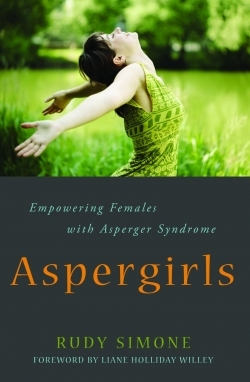Aspergirls
Empowering Females with Asperger Syndrome
- 2010 INDIES Winner
- Honorable Mention, Women's Issues (Adult Nonfiction)
Sometimes it seems there are more questions about Asperger’s syndrome than there are answers, so perhaps it’s time to consider learning more about it from the stories of women who are actually on the spectrum. That’s what writer and Asperger’s Syndrome consultant Rudy Simone has done. An Aspergirl herself, Simone interviewed more than thirty-five women on the autism spectrum, twenty to fifty years old, about their experiences with learning, working, dating, mothering, and more. The author argues that while men and women with Asperger’s may share some of the same traits, for example, a high level of intelligence and a sensitivity to sights and sounds, the traits are perceived and manifested differently. The book also points out the differences between Aspergirls and non-spectrum girls, particularly regarding social interaction.
Most of Aspergirls’ chapters include the author’s experiences, quotes from interviews with several women, an advice section for girls on the spectrum, and an advice section for parents. In the chapter titled “Higher Learning,” the author writes, “When it comes to college, I would say to all Aspergirls please don’t give up.” Later in the chapter, she urges parents to go to the university’s disability office because their daughter “needs an advocate for she may not be able to advocate for herself.” Many of the women interviewed offer frank information that is likely to help readers. When discussing marriage and cohabitation, a woman called Camilla says, “My son’s father and I live in the same house, are friends, but live separate lives largely due to my autism spectrum disorder (ASD). We live fairly happily, however.”
The “Additional Tools for Parents” section encourages parents to empower their daughters to have BALLS: Belief, Acceptance, Love, Like, and Support. Deborah Tedone, the director of an Asperger’s support group for adults, also shares the joys and challenges of raising an Aspergirl. While the voices of doctors and other experts would have strengthened the book, female readers will be encouraged to lead successful, fulfilled lives.
Aspergirls ends with an appendix that delineates Asperger’s Syndrome traits that seem particular to females (e.g., appearance/personal habits; emotional/physical; and social/relationship) and offers a rich list of references and resources, including two of the author’s books, Asperger’s on the Job and 22 Things a Woman Must Know If She Loves a Man with Asperger’s Syndrome. There is a wealth of information here that Aspergirls and their parents and teachers can use to build a better understanding about a complex disorder.
Reviewed by
Kaavonia Hinton
Disclosure: This article is not an endorsement, but a review. The publisher of this book provided free copies of the book and paid a small fee to have their book reviewed by a professional reviewer. Foreword Reviews and Clarion Reviews make no guarantee that the publisher will receive a positive review. Foreword Magazine, Inc. is disclosing this in accordance with the Federal Trade Commission’s 16 CFR, Part 255.

